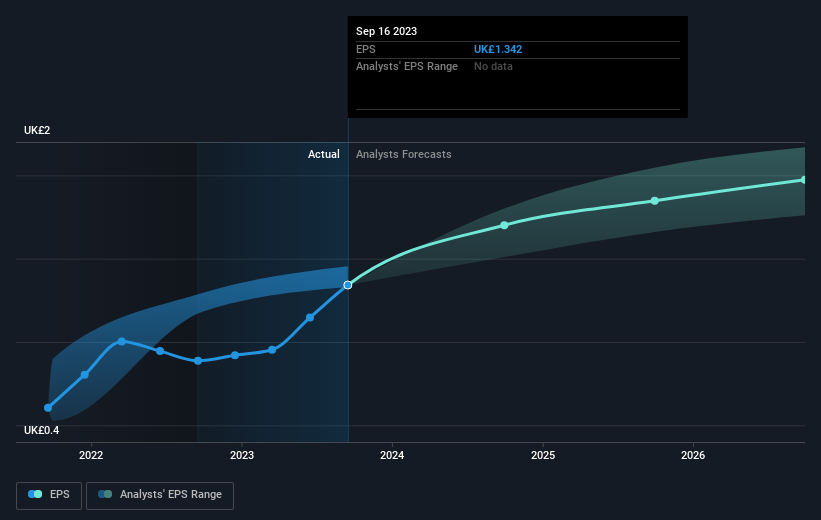The 30% return delivered to Associated British Foods' (LON:ABF) shareholders actually lagged YoY earnings growth
If you want to compound wealth in the stock market, you can do so by buying an index fund. But if you pick the right individual stocks, you could make more than that. For example, the Associated British Foods plc (LON:ABF) share price is up 27% in the last 1 year, clearly besting the market return of around 3.7% (not including dividends). So that should have shareholders smiling. Having said that, the longer term returns aren't so impressive, with stock gaining just 2.1% in three years.
Since the stock has added UK£1.2b to its market cap in the past week alone, let's see if underlying performance has been driving long-term returns.
See our latest analysis for Associated British Foods
To paraphrase Benjamin Graham: Over the short term the market is a voting machine, but over the long term it's a weighing machine. One way to examine how market sentiment has changed over time is to look at the interaction between a company's share price and its earnings per share (EPS).
Associated British Foods was able to grow EPS by 51% in the last twelve months. This EPS growth is significantly higher than the 27% increase in the share price. Therefore, it seems the market isn't as excited about Associated British Foods as it was before. This could be an opportunity.
You can see how EPS has changed over time in the image below (click on the chart to see the exact values).
It is of course excellent to see how Associated British Foods has grown profits over the years, but the future is more important for shareholders. This free interactive report on Associated British Foods' balance sheet strength is a great place to start, if you want to investigate the stock further.
What About Dividends?
When looking at investment returns, it is important to consider the difference between total shareholder return (TSR) and share price return. The TSR incorporates the value of any spin-offs or discounted capital raisings, along with any dividends, based on the assumption that the dividends are reinvested. Arguably, the TSR gives a more comprehensive picture of the return generated by a stock. In the case of Associated British Foods, it has a TSR of 30% for the last 1 year. That exceeds its share price return that we previously mentioned. And there's no prize for guessing that the dividend payments largely explain the divergence!
A Different Perspective
We're pleased to report that Associated British Foods shareholders have received a total shareholder return of 30% over one year. And that does include the dividend. Since the one-year TSR is better than the five-year TSR (the latter coming in at 2% per year), it would seem that the stock's performance has improved in recent times. Someone with an optimistic perspective could view the recent improvement in TSR as indicating that the business itself is getting better with time. Is Associated British Foods cheap compared to other companies? These 3 valuation measures might help you decide.
Of course Associated British Foods may not be the best stock to buy. So you may wish to see this free collection of growth stocks.
Please note, the market returns quoted in this article reflect the market weighted average returns of stocks that currently trade on British exchanges.
Have feedback on this article? Concerned about the content? Get in touch with us directly. Alternatively, email editorial-team (at) simplywallst.com.
This article by Simply Wall St is general in nature. We provide commentary based on historical data and analyst forecasts only using an unbiased methodology and our articles are not intended to be financial advice. It does not constitute a recommendation to buy or sell any stock, and does not take account of your objectives, or your financial situation. We aim to bring you long-term focused analysis driven by fundamental data. Note that our analysis may not factor in the latest price-sensitive company announcements or qualitative material. Simply Wall St has no position in any stocks mentioned.

 Yahoo Finance
Yahoo Finance 
